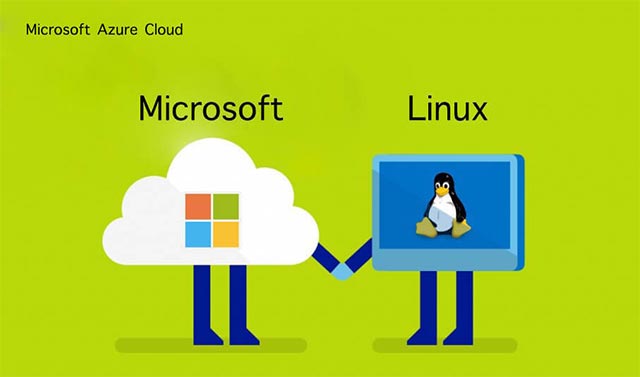Microsoft officially submitted an application to join 'Linux secretion'.
In the past few years, Microsoft has completely changed its attitude towards Linux, from opposition to hostility to cooperation. The latest move by Redmond giant shows that they are really serious about Linux-related projects, which is to offer to contribute to Linux-distros security mailing list - a special email list only for Linux distributors, used to send internal reports to development companies, licensed Linux distributions, as well as coordinate and discuss security issues for those developers. release Linux.
- Windows Phone 8.x and Windows 8 are no longer receiving application updates
 Microsoft has completely changed its attitude to Linux
Microsoft has completely changed its attitude to Linux
If they are included in this 'secret society', Microsoft will have early access to Linux-related security vulnerabilities that can actively complement their own contributions and ensure stability for products developed based on Linux they are distributing.
Microsoft recently revealed statistical results showing that Linux is getting more and more used than Windows Server on their Azure servers. Keeping all customers safe is an extremely important task, which is the perfect reason for Microsoft to urge Linux managers to approve the offer to join Linux-distros security mailing list.
Linux-distros security mailing list currently includes familiar names like FreeBSD, NetBSD and most major Linux distributors including Canonical, Debian, Red Hat, SUSE and some cloud Linux service providers like Amazon. Web Services (AWS) and Oracle. This 'secret society' is a place for them to discuss and find solutions to unreleased security issues, as well as to develop quick fixes.
- Windows Terminal has a preview version on Microsoft Store, invite download and experience
Microsoft participated in this 'registration review' as a new Linux distributor. Sasha Levin, a Linux kernel development engineer at Microsoft said:
"Microsoft possesses long-term experience, up to decades in resolving security-related issues through Microsoft Security Response Center (MSRC). Although we can be fast (in the 1-2 range). hours) create builds to address newly discovered security issues, of course we want to actively check and validate extensions to security issues before publicly publishing builds "Becoming a member of the Linux-distros security mailing list will give Microsoft more time to test more extensive and tight builds."
In the proposal to join Linux-distros security mailing list, Microsoft did not forget to mention that the percentage of Linux users on their Azure cloud service has surpassed Windows itself, so the MSRC has begun to receive more and more security reports related to issues with Linux code both from individual users and suppliers.
- Already have Windows 10 Caculator version on Android and iOS, download and experience
 The percentage of Linux users has exceeded Windows on Azure
The percentage of Linux users has exceeded Windows on Azure
Please apply to join the Microsoft Linux-distros security mailing list that will be discussed and voted publicly in the coming weeks. The high possibility is that Microsoft will succeed because the company is receiving the support of a few big names in the Linux world, especially among them, Tyler Hicks, the engineer responsible for Canonical Linux. Tyler thinks that Microsoft's direct involvement in Linux distributions will benefit other members.
Everything is supporting Microsoft, perhaps their official membership in the Linux-distros security mailing list will only be a matter of time.